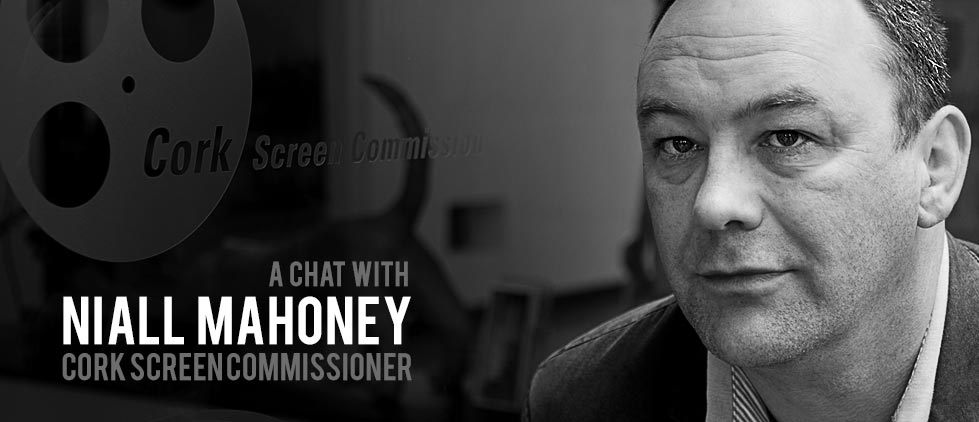
by Dan | Mar 18, 2013 | Education, Producing, Short film
We caught up with Niall Mahoney, the Cork Screen Commissioner for a chat about the work of the Cork Screen Commssion, and Niall’s views on the film making industry in Cork.
Can you give us an idea of the work of the Cork Screen Commission?
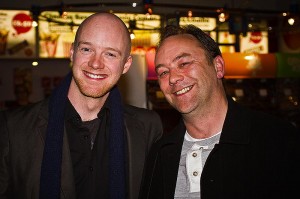
Niall with Shaun O’Connor at Made in Cork screening Cork Film Festival
The Screen Commission’s remit is basically twofold; to help, support & nurture the indigenous Screen Industries (I say ‘Screen’ rather than Film or TV, as the whole industry is changing & it’s becoming more about on-line platforms), plus establish Cork City & County as a ‘prime filming destination’ to both National and International screen producers.
Simple as that may sound, it’s actually a lot of work for one person, as it involves all sorts of things like meeting Producers, Writers, Directors, Location Managers etc.; giving advice & help; providing free location recces to incoming companies, hooking up Cork producers with funders and other experienced Producers in Dublin & the UK, gaining permissions to film, writing articles and doing PR to help raise awareness of Cork generally, running Seminars and Courses/Workshops that will help the indigenous industry plus running the portal website, www.corkscreencommission.com & keeping that updated with News, information and new locations, production support, facilities and local crew/cast.
I’m also asked to speak at Festival openings and seminars quite a lot, so there’s a high public profile involved, which is new to me!
Of course, as a publicly funded position, there’s a lot of report writing and accountability going on in the background, which people don’t often see, and that’s a time-consuming and laborious task! I’m an Industry animal, so am used to getting on with the actual production rather than writing about what I’m doing, but in a way it’s justified as any public money should be well spent & every penny accountable, so it’s a necessary evil!
I try to spend an increasing amount of time meeting local Producers, writers, DoP’s & Directors to try to help them establish themselves as professional working teams and production companies so they can present a professional front to funders like the Film Board. This is a crucial ‘next step’ I believe for many of the great teams working in Cork on low or no-budget projects. In my mind, it’s one thing to produce things for little or nothing using friends & colleagues, but they must move on & up at some point to become professional entities that can apply for proper funding – otherwise nobody can make a living & stay in the industry full time. If just one team gets together and is successful in getting funding for a project, whether that’s a Short, a Feature or a TV program, through my help I will have considered my time as Commissioner to be well spent.
One of the bits I enjoy best is meeting local Producers at functions & screenings, such as we did during the Cork Film Festival with Southern Screen Professionals, Egomotion & the Cork Media Freelancers Group – that’s when I get a chance to talk with real film makers and connect with the people that I really want to help. I come from a hands-on, production background so this is where I feel most at home, talking about shoots and scripts etc. The Commissioners job can be a bit isolating at times, as it is an ‘official’ position I guess and I work essentially on my own and not part of a production team, so it’s good to connect with the ‘coalface’ if you like & talk about actual productions that are happening.
What’s the best part of the job?
Free Corona at the Cork Film Festival opening!! Seriously, the biggest sense of satisfaction I get is seeing a team of local film makers come into me to ask advice about how to move to the next level and see their confidence grow as we go through their skills and future possibilities. Sometimes people just need a bit of affirmation and a point in the right direction, or maybe a crucial contact with a Producer or Funder, and that’s where I come in. I see my job as someone who ‘joins the dots’ if you like & helps people get on in whichever area they want to. The Commissioner’s position is well needed, in that it allows someone to have an overview of the industry and an official title which outside organizations respect, so I can open doors at the start & give people a chance to sell themselves & their ideas. That’s important in Cork, as there’s no centre of production or commissioning editors down here, so there’s a geographical distance which can make things seem difficult.
Other than that, I come from a Drama background, so there’s nothing like being with a full crew on location surrounded by all the Departments – I love the ‘circus’ atmosphere it brings! For me, there’s nothing quite like Drama.
What is the biggest challenge for the Cork Screen Comission?
That’s a tricky one, as there are so many big challenges facing us! I suppose in general terms it has to be securing finance; both for productions, infrastructural projects (like the creation of a decent sized studio for example), training, distribution and of course to keep the Commission growing into the future. I’d love to see a Film Award in Cork and money to help people enter films into Festivals & to go there to network too, but that all takes serious investment and times are very tough as you know. Other challenges include getting established Dublin/Wicklow Producers and Production Companies to see Cork as a realistic alternative to shoot in (and get crew/cast from), and to find a way to financially support Start-Up companies where the individuals concerned don’t have hard cash to invest. Currently, if you can bring hard cash to the table, you can access public funds, but if you don’t, you can’t – that doesn’t seem right to me, as they are the very people we should be trying to help! There’s a huge amount of skill, energy & enthusiasm in Cork, but that’s being stifled by the inability to progress to setting up proper companies which can then apply for Development & Production funding and create some real jobs and stability for people trying to live & work here.
Are there any areas you feel that need to be developed with regards to film-making and the industry in Cork?
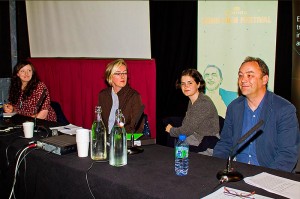
Commissioner and Expert Panel at Cork Film Fest Industry Seminar
Yes, very much! We need to create the basis of a proper industry here across the Screen Industries, and I am convinced that if we can reach a critical level it will be catalytic; spawning more production companies and freelance work, plus raising awareness of Cork as a serious player & therefore attracting more people in, and so it goes! It’s a bit ‘Chicken & Egg’ of course, which is a problem, but what I’m trying to do, or at least start, is in getting people with complimentary skills together, e.g. Writer, Producer, Director, DoP, to form proper, professional teams and production companies. This is vital in order to go for proper funding and to start working professionally together. Companies need to start working on a slate of development & production ideas; demarcating the work and roles so that they’re focussed and share the load equally. I, in turn, am simultaneously trying to set up key infrastructural projects which these companies can use so that they can establish a rolling slate of projects that will keep them in work full time and grow their experience & profile. These are things like the Studio that I mentioned, plus getting a proper high-end Grading f acility together in Cork and also securing money and/or premises for Start-Up companies who can cross fertilize with each other in the same building.
I am currently working on all of these ideas, plus identifying key growth areas and skilled, Cork based professionals, in the areas of Animation, Finishing, high-end digital camera rental and On-Line Content. Things are growing here – we have proper Post Production Sound mixing here now, plus excellent lighting hire and four or five small production companies, but we need to develop more of these.
The biggest thing missing, in my opinion, is in production – we seriously lack experienced Producers and Production Managers to organize and drive projects from inception through to exhibition; to lead the team, deliver the product and, of course, chase the money! Without these key people things just don’t develop enough. We have one or two production people resident here who have the potential to be really good producers, but in that old ‘chicken & egg’ scenario again they are not getting the right experience on properly funded projects that will enable them to grow projects and companies here.
I am trying to resolve this by identifying key people here & putting them in touch with more established companies in Dublin & seeing if they can ‘shadow’ Producers & PM’s on shoots up there to get that vital experience. The events I ran at the Film Festival worked really well in bringing top industry professionals down here to see what’s happening and to meet the key teams & production people, so I have hopes for that in the long term. I’m also identifying experienced Producers around Ireland who either have some connection to Cork or who are willing to work with people here on ideas and am putting them together to see what comes of it.
What are the benefits film can bring to a county or indeed a country?
As a Regional Screen Commissioner I’m obviously focused on the County benefits rather than the National ones – that’s the job of the Film Board and RTE officially and they are designated as the national organizations to represent Ireland as a whole abroad. The local benefits I see are fundamentally to bring freelance work in to professionals based here, to create freelance & ultimately full time employment in highly skilled, ‘clean’ creative areas, and the subsequent economic spin-off directly to the local economy via location fees, production spend and Tourism on the back end.
Creatively, the Screen Industries offer a way for us to communicate our ideas, messages and creativity to a worldwide audience from our unique perspective, and that is important for any Region in the World. The set of social, economic and cultural values that we have here in Cork allows us to comment and add to the international discourse in an increasingly connected and converging World where we share common issues and concerns about the future and the way we see ‘society’ going for better or worse. Cork has as valid an input into this as any other place in my opinion, including the big cities of the World, and with the New Technologies we can overcome the geographical obstacles that have kept us on the perimeter of this discussion in the past.
What are the unique things Cork city and county can offer film and TV producers?
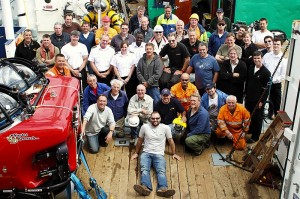
Niall with Dark Secrets of the Lusitania Doc crew
OK – here comes ‘The Sell’!! As the largest County in Ireland, Cork is unique in the range of photogenic, underused location in the Country; comprising 4 distinct geographical areas plus the second biggest City, which has it’s own wealth of preserved period as well as modern architectural features. Add to this newly improved motorway links to Dublin and a brand new International airport that can get you to & from central London in less than an hour & you have a very attractive destination! And there’s more….. Cork is blessed with a range of Towns, all within easy reach of the City, that are both beautiful and big enough to support a full sized crew, with enough beds, restaurants & support services nearby to make filming cost effective. They also possess a range of great natural & historical/architectural locations within a very small radius, meaning you don’t waste time & money moving the crew around. You always have the infrastructural back-up of the City behind you as well, so you can get most anything you need. Finally, having a dedicated Screen Commission in place to help with official permissions, location recces and sourcing all manner of facilities & production support locally makes life a lot easier and cheaper for Producers. A Producer can access these remotely via the portal website and then speak directly to an experienced production person (me!) anytime, which is really important in this fast-moving industry.
In fairness, thanks to the stated aims of both Councils, we can honestly say that we are a film friendly Region, and having that official goodwill on our side is invaluable, as all good Producers know how difficult & expensive it can be to film in a place where they are either not very welcome or people are fed up with film crews!
I could go on, but you get the idea!
What is your impression of the film industry in munster, and in particular in cork at present?
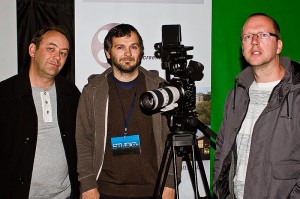
Niall with Paddy O’Shea & Declan Recks, Director at Studio 5108 Canon Masterclass
I think the industry is still very fragmented across Munster, and in many ways embryonic, but things are improving slowly. I honestly feel that Cork is taking the lead, however, and the evidence for that can be seen in both the amount & quality of work being produced here last year and this year, and the reaction of Industry leaders from Dublin who came down to the Film Festival and expressed their interest and surprise at how much was going on! The word is coming back that people are starting to talk about what’s going on in Cork on sets around Dublin, and that’s got to be a good thing!
I noticed a definite and immediate upturn in confidence and determination in the indigenous industry after the Film Festival and in the New Year – the phone started ringing on the 2nd January with people looking for meetings re developing projects and Dublin-based Location managers wanting to come down on recces. I’ve put a lot of work into the latter, and am glad to see that it’s starting to pay dividends. Creating an whole industry is always going to be a ‘slow burn’ as you build trust, awareness and confidence, and the last year’s work was all about doing just that to get to this point. Some people expect immediate, tangible results, but I’m afraid our industry is just not like that!
I have a real confidence that we are on the road to creating a viable industry here – what we need now is to create some proper Production Companies and get Producers on board to secure decent funding for productions. Once that happens, they can develop their slate of productions, raising their skill level, experience and reputation to get further work & expand the industry here.
Strangely, I think we’re fortunate in a way here, as opposed to traditional production centers like Dublin. The industry is changing massively, and budgets/advertising and production revenue is plummeting. That’s bad news for the big players and established companies, who have the weight of expensive Rents, rates, employees and ways of working which are becoming just too expensive in the face of fierce international competition.
As we don’t have all that, we are free to grasp the opportunities that the New Technologies and platforms offer us and can start producing material that is both creative, cost-effective and audience-centred, which is what the market wants these days. If I could say one thing to the industry here it would be ‘Go out & do it – you have nothing to lose!’
For further information or advice you can contact Niall at: info@corkscreencommission.com
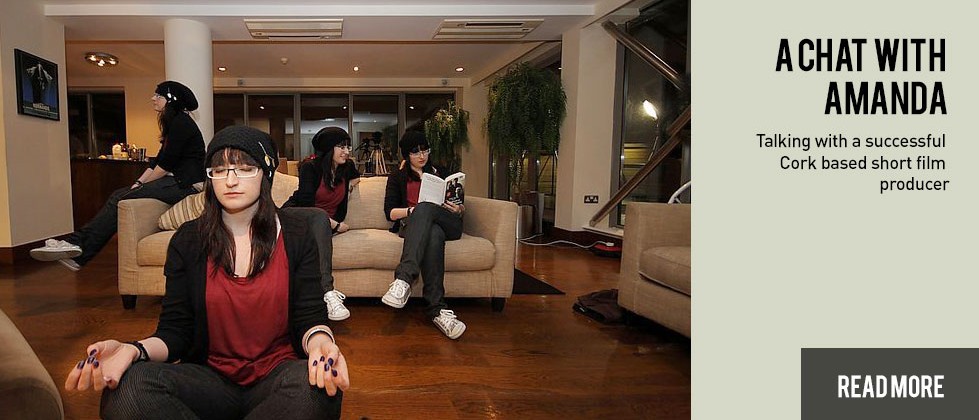
by SeanBreathnach | Nov 23, 2012 | Education, Producing
[image_frame style=”framed_shadow” align=”left”]http://egomotion.net/wp-content/uploads/2012/10/amanda1-179×300.jpg[/image_frame]
A Chat With A Cork Based Movie Producer
Amanda Ferriter began working in Theatre Production in 2004. She has worked as a Production/ Stage Manager with various companies including Cork Opera House), Guiness Jazz Festival, St Patricks Festival, Opera 2005, Yew Tree Theatre and Cork Midsummer Festival. In 2005, she working with the Scottish production company GridIron in the Edinburgh Fringe Festival. She recently stage managed a national tour of Verdant Productions ‘Guerilla Days in Ireland’. Amanda has also produced the award winning short films ‘Heart’ and ‘Partly Cloudy’ by Mark Cogan, ‘Gemma?’ by Kevin O Neill, ‘Mutt’ by Shaun O Connor. She was also co-producer of Liam Delahunty’s ‘Tom’s Sceadu’. Her current project is ‘The Nymph’ by Damian Byrne.
What is the best part of the job?
I honestly can’t pick one part of the job that I prefer over another! I love being on set and seeing what is on the page come to life, from the very first take to wrap its great watching the story unfold in front of you. Being the producer, most of your prep work is done so you have time to be on set and soak up the atmosphere! Another part I love is having the first public screening. Sure its nerve-racking not knowing how it will be received but ultimately people getting to see the short is one of the reasons why we make them. There’s no point in working hard for a project to sit on your computer for no one to see.
What is the worst part of the job?
The worst part for me is asking people to either work for free or at a reduced rate. There are so many talented people in the film industry in Cork but unfortunately there are not enough funding resources for everyone or for the amount of work being produced. Yes there are things like Fundit and kickstarter but it seems to me that the majority of projects are self-funded. I’d love to be able to pay everyone what they deserve, sometimes that’s just not possible. You do the best you can with your budget, but there can be times where you have to postpone the project and wait until you raise a bit more funding or you can scrap it… That’s never an option!
Leading up to a shoot – how much preparation do you do?
I would do a lot of the preparation leading up to a shoot, from finding locations, crew and sometimes cast (usually directors have some actors attached already or have people in mind for the roles) to organizing the schedules, logistics, catering, dealing with budgets, hiring equipment and arranging insurance. I’d liaise with each HOD to ensure that they have everything they need before getting to set. A lot of people say I’m crazy for liking the production side of the shoot but there’s a huge sense of satisfaction when you can make something come together.
[image_frame style=”framed_shadow” align=”left”]http://egomotion.net/wp-content/uploads/2012/11/IMG_7399-300×200.jpg[/image_frame]
What do you want from a Director? What is the ideal relationship?
Mutual trust and understanding. It’s so important to have that in the director/producer relationship. For a director, you are trusting someone to bring all the elements together. As a producer, you want to do the best you can so that what ends up on screen is what the director envisioned. Yeah there are times where you have disagreements where one person doesn’t want to budge on something, whether its a creative or budgetary issue, so you look at the bigger picture, find a compromise and do what’s best for the project. The Director and Producer want to create something that people will enjoy and they have to be on the same page for that to happen. They spend a lot of time together and talk numerous times a day in the lead up to a production so you have to get along on a friendship level too. I’ve worked with some really great Directors and I’m glad to call them my friends.
What was the biggest challenge regarding your most recent film?
The short film I’m currently producing (The Nymph by Damian Byrne) is proving to be the most challenging! It’s a night shoot with a few effects so making sure every detail is thought through carefully and planned properly is essential. We have an extremely small budget but its such a great story that it needs to be put on screen. We’re filming over 2 nights in an amazing location but if it rains, we’ve no choice but to postpone until early 2013. My main challenge on this however is having a tiny budget so we have to beg, borrow and steal in order to get it done. There are some amazingly talented people attached to it so as long as the rain holds off and I can put everything in place, I know something great is going to be created, despite the lack of a big budget!
[image_frame style=”framed_shadow” align=”right”]http://egomotion.net/wp-content/uploads/2012/10/amanda21.jpg[/image_frame]
At what point does the producer divorce themselves from a project?
For me, I’d take a step back once a project has been screened in a few festivals. After a film has been completed, I’d discuss with the Director what festivals to submit to. We’d work towards getting it screened in as many as possible, that can take longer than a year but once we feel that its had enough screenings, I think its time to put it up online for a wider audience to view it. With ‘Heart’, I wouldn’t let Mark put it online for at least a year and it was quite successful on the festival market but the online views have so far exceeded over 80,000, its far more than we could of hoped for and we are delighted with. You can stop working on a project but you never really divorce yourself fully as there’s always a sense of pride in something you’ve worked so hard on.
Who would you say your biggest inspirations are in the film world?
What inspired me to get into film was (and people may laugh at this reply but..) Lord of The Rings. I was in New Zealand in 2009 and went on a daylong tour of the filming locations around Wellington. It was really fascinating to see how they took a patch of green by a housing estate and turned it into the gardens of Isengard! I’ve always been a huge LODR fan ever since the movies came out and I used to watch the ‘making of’ more than the films themselves. When I got back to Cork, I started looking at my options and as film had always interested me, I decided to enrol in the St John’s film course. As for any favourite Producers or Directors, I don’t have any, as there are so many that I like. I don’t have a favourite genre either but I am fan of sci-fi and fantasy books and films and would love one day to be able to produce or be involved in making that genre of film here in the south of Ireland. Its great to have favourites but I like to be open to all films and genres.
What is your impression of the film industry in munster, and in particular in cork at present?
[image_frame style=”framed_shadow” align=”left”]http://egomotion.net/wp-content/uploads/2012/11/LIT_film_fest012.jpg[/image_frame]
The film industry in Cork is great at the moment! There are so many talented cast and crew producing amazing things. For a county that doesn’t have much funding available to us, the output of good quality work is incredible. I could list people but I’d be here for ages! There’s a great ‘can do’ attitude among everyone at the moment and a lovely camaraderie with people willing to help each other out too. I think its going to take another few years before we see big budget films frequenting the city and county but I hope it will get there eventually. The ‘important’ people are beginning to take notice of the talent and facilities available here and as long as we keep going as we’re going, its for our and future film makers benefit.
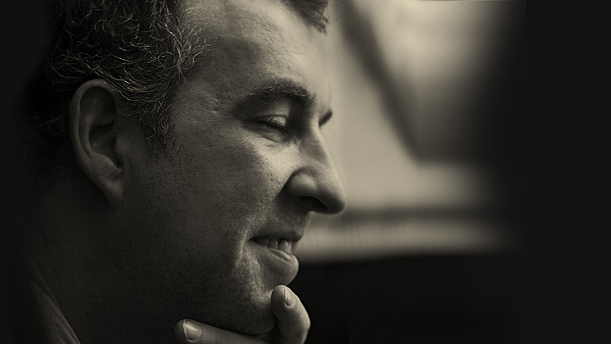
by SeanBreathnach | Jul 5, 2012 | Cinematography, Education, featured, Short film
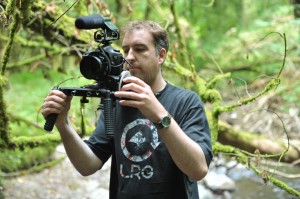
This week we interviewed one of the hardest working camera operator’s and D.O.P.’s in Cork, Paraic English.
Páraic has worked as DOP on dozens of films, including ‘Hungry Hickory’ (Short Film, Dir. Damien McCarthy) and ‘Penny’ (Short Film, Dir. Patrick O’Shea). He has shot and edited short films, documentaries, adverts, stock and catalogue Shoots in Ireland and abroad. A comprehensive list of credits can be seen on his IMDB page: http://www.imdb.com/name/nm3279826/
Every time I attend a film festival in Munster I see your name on films. Have you worked with everyone in Cork at this stage?
Nope. Cork is so small, crews and cast often overlap over different projects. It’s good for continuity and building working relationships but at the same time I’m always happy to hear new ideas from ‘strangers’ or strange ideas from ‘newbies’.
Are you shooting something at the moment? Can you tell us a little about it?
Ya always working away on something thankfully, it’s wedding season! I enjoy doing short promos, most recently one for an Opera Production, part of the Midsummer Festival. We have some scenes left to shoot for Kevin O’Neill’s upcoming short film too and a trip to the west of Ireland is in the offing soon too to shoot the CFC/RTE Short Script Award Film ‘Leanbh’. Other than that I’m kept busy freelancing for production companies grabbing B-Roll, talking heads and sunshine shots for corporate and event films. Trying to get my head around motion-controlled timelapse for a wee trip in August too. It’s complicated and I don’t have a head for figures.
How important is the script to you?
It’s the blueprint for months of planning and effort as far as production crew are concerned. However, there’s so much room between the words for actor performance, score, camera and pacing that I’m often thankful I’m only a techie. I rarely read it more than twice.
What is your favourite part of the job?
Apart from the early starts and late finishes? Eh, editing. That’s where it all comes together. You do get to see some cool stuff now and again. Film is something that can bring people together so that’s nice to be a part of.
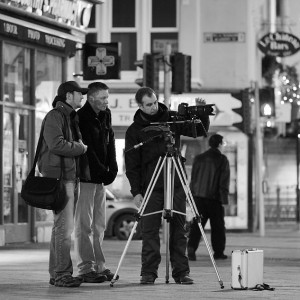
What is the worst part of the job?
Multi-tasking. Keeping an eye on light continuity, eyelines, shooting for the edit, boom in shot, makeup, shadows, composition, moving the camera, the other cameras, unravelling the slate notes. You get the idea. You’d be knackered after it.
Who would you say your biggest inspirations are in film?
Werner Herzog, Roy Andersson, Robert Altman, Hitchcock, Fellini (for the madness and the moving camera), Scorsese, Orson Welles for Lady From Shanghai alone, I’m partial to a bit of Terence Malick too. Anything Jack Cardiff shot. I like the stylistic touches of Jean Pierre Jeunet & De Palma too sometimes. Roger Deakins is a great storyteller and shares lots of his techniques online too which is great for anyone with an interest. Laurel & Hardy films are always a winner.
What was the biggest challenge on your most recent film? Do you find the same challenges coming up again and again?
Ya always the same challenges. Smaller budgets mean short shoots in locations that often can’t be modified or adequately lit and sadly the lack of technical prep time can have consequences. Compared to the challenges of the production team they pale – everyone does the best they can with what they got. I have lots of admiration for anyone who actually makes a film, it takes a lot of guts.
How much have things changed in your line of work in the last ten years?
Very little. It’s more affordable in some ways to get a good image onscreen but a good story well told will never change. The internet is probably the greatest change. New market and a whole new set of imponderables.
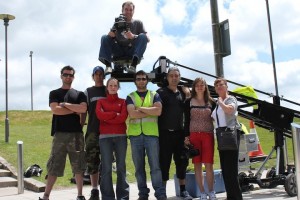
Have you particular advice to give amateur film makers regarding camera work and lighting in their movies?
Fix it in post.
What do you think of the condition of filmmaking in Cork at the current time?
I’m optimistic. In the past, scripts may have fallen by the wayside but there now seems to be an appetite and personnel to see through projects to a high standard. Lots of distinctive original voices coming through. Ireland is a cinema-loving and cinema-literate nation. My wish would be that this would continue so we can make our mistakes now and if funding materialises in the future we’ll be in a better position to deliver something we can be proud of.
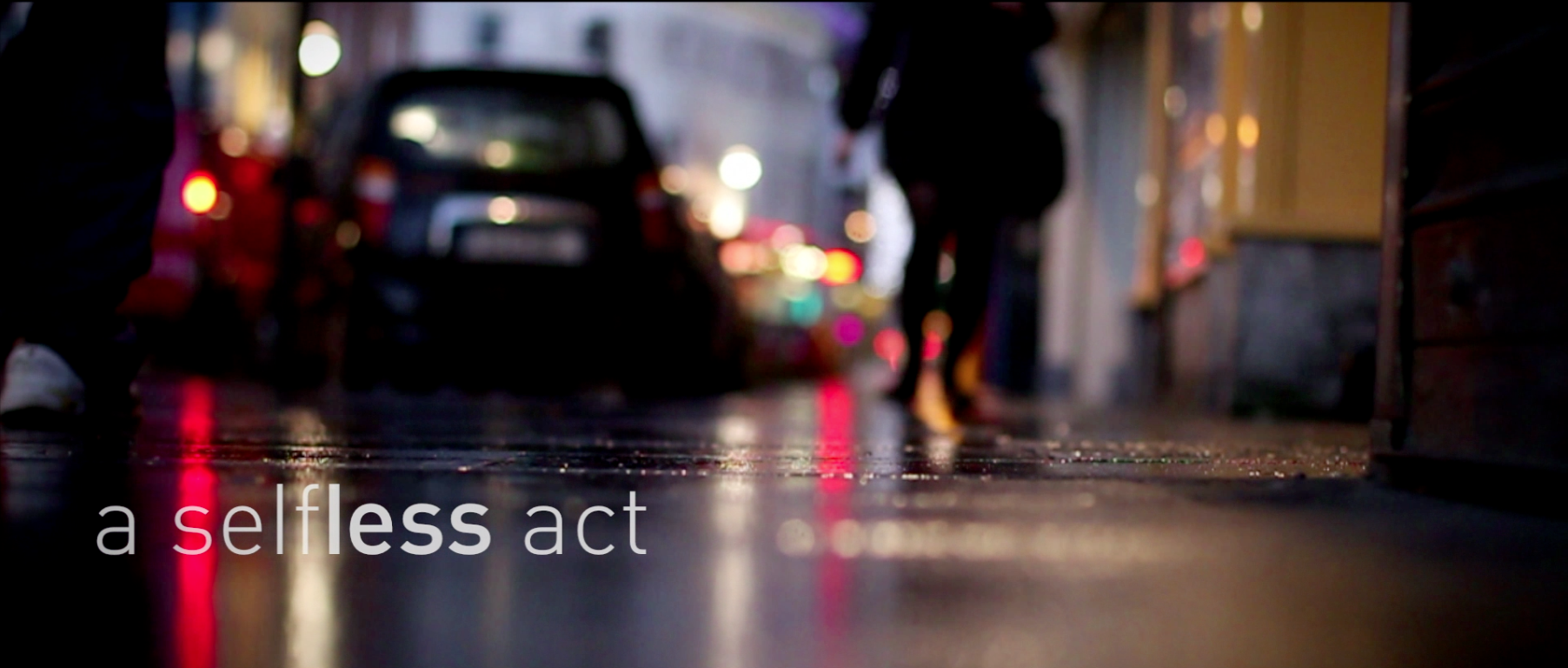
by Dan | Jun 11, 2012 | Short film

Winner of the Ford 8minutes Short Film Competition.
Written by: Dan O’Connell & Frank Hurley
Directed by: Dan O’Connell
Starring: Frank Hurley & John Ryan Howard
Director of Photography: Jason Keane
Available to watch online now on the irish film boards website
‘A Selfless Act’ was made especially for the Ford 8minutes Competition and addresses the themes of hope, selflessness and the division of classes from the Titanic 100 Celebrations. The film features an old homeless man (played by Frank Hurley) who has a brief encounter with a wealthy young business man (played by John Ryan Howard).
Set in Cork City on a wet and dreary night and shot entirely on location by Director of photography, Jason Keane, the film uses 100% natural lighting and features an amazing soundtrack performed by Odi, entitled ” One in a Million” which can be purchased online http://www.odimusic.co.uk, http://www.itunes.com/odi
We had a great time making this film, which was all shot in one night and the edit was finalised only 3 days later, we had great help and support making it from some really great people, including the fantastic Staff and Management of Londis on Bridge Street, they even gave us free Coffee!! Catherine Crowley who ran around ragged trying to piece together the costumes and props, Valerie Hely who helped us get the awesome ‘Odi’ soundtrack, Desiree Murphy for feeding us all as we ran around like blue arse flies.

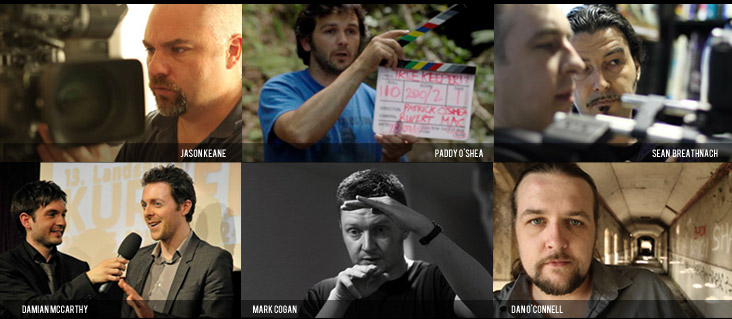
by SeanBreathnach | May 19, 2012 | Education, featured, Short film
We interviewed some local independent filmmakers to find out what drives them, what barriers they need to overcome, and what they think of the filmmaking buzz which is currently gripping Cork.
Click here to read the first part of the article
The Interview: Part 2
6. What advice would you have for anyone who wants to get into the movie making business?
Jason: Make sure you’re doing it for the right reasons! There will be many lean years before hopefully you will be able to make a successful living from it. The only thing that will sustain you during these years will be passion and love for the craft and medium. You really have to love it. In fact, it’s more like a vocation than a career.
Damian: If you can’t attend a film school then go along to film appreciation classes. Watch as many different films as you can. Write everyday. Put work into coming up with original ideas. Shoot something and learn how to edit it. There are loads of free tutorials online. Just start making short films. The first 5 or 6 will be really bad so don’t worry too much about them. I have never seen anybody made a good first short film. You just have to look at what worked and what didn’t and learn from it. I would also never abandon a film even if you know half way through the edit that it’s terrible. People helped you make it so the least you can do is finish it to the best possible standard.
Dan: Do it. It’s a blast. But don’t expect anything back, only what you put in.
7. What was the biggest challenge regarding your most recent film?
Seán: With ‘Searching For Ten’ it was probably locations. I had particular locations in mind that had character that fitted the story. I looked at a lot of locations all over Cork andWaterford. Here’s where a locations manager would have been a big help! In the end though, lots of people came through for us. Vibes and Scribes were great, as were CIT and O’Keeffes grocery at St Lukes, along with John and AJ Finn. The people here are enthusiastic about supporting local films.
Dan: It was definitely the edit. It’s a fractured timeline, so the possibilities are almost endless, the biggest problem is you get so wrapped up in the edit that you forget the big picture, you loose your understanding of the film. In some ways it was great having so much freedom to throw shots around wherever you want, but you see the same shot over and over. How do you tell the story if the words lose their meaning.
Jason: I’ve just started DP’ing a feature for someone so this is a real challenge. It’s my first feature so it’s a big step-up from shorts, corporates and live events. Things have started well so hopefully it will continue in that manner. Good preparation is so important. Exciting times ahead!
Damian: I’m in the very early stages of my first feature film now so the script is definitely the hardest thing I’ve ever done. I’ve written feature length scripts before but they were a mess. Mainly because I just launched into them with no real plan. I approached this script better though. I worked on plot for 6 months before even attempting to write a single page of the screenplay. I took a lot of dialogue notes too so when it came to the actual writing of the script it was easier. If you start writing a 90 page screenplay without a plan you’ll be lost by page 20. We have one short horror set-piece shot so far and I’m really happy with the footage, but this one scene has somehow resulted in more rewriting. I don’t mind so much as long as I’m replacing good ideas with better ideas, or making changes that are going to make the film more entertaining, but it would be nice to say ‘the script is finished’. Done. The story has always been the same it’s just how it’s being told changes. I think it was George Lucas said that ‘films are never finished they are abandoned’ – I’m starting to think this is also true of the script.
8. Would you recommend festivals or the internet for promoting short movies?
Mark: Festival screenings can be great. Some are quite prestigious and it’s always nice to be selected for a programme, especially in other countries. However these days I think having your film online is a far better option. The world is literally your audience and it has potential to be viewed by far more people than if it were screened at a dozen festivals.
Damian: Festivals first then the internet. Film festivals are great exposure. Good way of making contacts too. I usually wait until the films have played in a number of festivals before putting them up online as some festivals don’t want to screen something that’s available online. Once it’s played in a few places the internet is great for giving it a longer life. I’ve had festival programmers invite some of my films to screen at festivals having seen it online so having a film online doesn’t mean its festival run is over either.
Jason: Both. Festivals are a great way to sell yourself and meet other filmmakers. Once your film has done the festival circuit then it’s always a good idea to upload it to Youtube and/or Vimeo. Who knows who might get to see it!
Dan: I think both are good options. I tend to hold mine back from the internet in the hopes that one day I might actually send one out to a festival. Once it’s up online you kind of ruin your chances of getting into a lot of them, but then if you get your film online and get a million bejillion hits! Then that’s way cooler than getting into even the major festivals. If your film is any good then you want your film to be SEEN by as many people as possible, that’s the most important thing.
9. Who would you say your biggest inspirations are in the film world (directors, actors, cinematographers, etc)?
Patrick: I take inspiration from lots of different areas of film. I do have my favourite film makers whose work I would seek out every time they release something new. For example, Pedro Almodovar, The Coen Brothers, Darren Aronofsky, Quentin Tarantino to name but a few and I would also constantly watch and re-watch old classics and in particular the films of Stanley Kubrick.
I also find inspiration in an actor’s performance, Michael Fassbinder in ‘Hunger’ for example or Colin Firth in ‘The King’s Speech’ or Imelda Staunton in ‘Vera Drake’.
More recently I was very inspired by ‘Tinker, Tailor, Soldier, Spy’. It is such a well rounded, well made film. The writing, the directing, the beautiful camera work and production design and the amazing performances.
Jason: I have many favourite directors but it was especially the films of Akira Kurosawa and Stanley Kubrick that inspired me at a young age and opened up a whole new world of cinema to me.
Dan: That’s like putting a bowl of rice crispies in front of me and asking which one is the tastiest! I simply cannot say. Suffice it to say, that if I have seen their work in a cinema, on a DVD I bought or if I actively sought them out to watch online then they have achieved far more than I have yet and they are all inspiration to me.
Damian: I like actors and directors that take chances and do something different. Some of my favourite films are films that, when they’ve finished, you don’t really know what to make of it but there’s something about it that makes you want to watch it again. I think a lot of Stanley Kubrick’s films were like that for me. It took a second viewing to realize what he was doing and twenty views later you’re still discovering something new. I think he said ‘real is good interesting is better’. It sums up his films well, especially in the strange performances he gets from his actors.
10. Could you summarise how you recruit your primary cast and crew?
Dan: I held auditions for my last film as I was actively trying to find some new faces. A good friend of mine, Eoin hAnnracháin helped me a lot. He set up the auditions and found some great acting talent form all over the country. The crew, all of them, are great friends of mine. I help them out on their films, and they help me out on mine. The crew can change from film to film but that’s only because we are doing it for free and we have to work around peoples schedules. Sometimes people are not available and you have to work around that.
Damian: Enthusiasm over experience… within reason. I work with people I get along with. I read in some filmmaking book you shouldn’t make a film with anybody you wouldn’t go on holidays with. I wouldn’t go that far but maybe replace ‘going on holidays with’ for ‘a night in the pub’ and I think it’s sound advice. Making films are fun but the shoot can be tough and you need to have people there you trust and that you can ask for help if you get stuck. I know the director is supposed to know everything but it’s reassuring to know you can ask for a suggestion and then decide on what is best. The director gets all the credit at the end of the day anyway!
Jason: When I lived in New York, I would use Mandy.com, Craigslist and NYCastings to cast actors but since I returned to Cork I have relied mainly on Egomotion.net and FilmmakersNetwork.ie. Word-of-mouth is always important too of course.
11. What camera did you use to shoot your latest film, and why did you chose it?
Damian: I’ve made films on 8mm to 16mm to the 7D and I think it’s a balance of whatever suits the look of the film and with whatever your Cinematographer is most familiar with. It is important what you film on, but I think what you’re filming, as in, what is in front of the camera is more important. Is your location interesting? Is there texture on screen? Is the lighting right? Do you have unusual props? These are always more important to me than what piece of equipment we’re actually using. You could shoot some terrible unwatchable show like Fair City on the most beautiful grainy 35mm film stock in the world. Won’t make it any better.
Mark: We used a Canon 7D. The quality is superb and being able to change lenses really gives your film that professional cinematic look and takes it to the next level. I’ve shot my last three films on the 7D.
Dan: We shot using a canon 7D and a 5D mkII because they’re cheap-ish, we had access to them and they give great creative control over the image with nice large sensors and great availability of lenses.
Jason: The Canon 5D MarkII. It has its well-discussed limitations but if you’re aware of them, then you can work around them.
Patrick: We decided to shoot our debut feature film on a Canon EOS 5D Mark II. There was a number of reasons for choosing this camera. It has a full frame sensor and a beautiful filmic image when used correctly. It is a relatively affordable piece of kit for the quality of image that is achievable. The 5D is also very small and light and we were able to achieve very high and long crane and jib shots with the camera strip down to its basic shape. Also, because of its small size we were able to move around in small sets and locations and fit it into and onto moving vehicles.
Some drawbacks of the camera include rolling shutter, moire and aliasing issues and a limited dynamic range, but if you do enough camera tests and play to this camera’s strengths the results can be stunning.
Finally, what do you think of the film industry talent in cork and cork as a location for film?
Patrick: I think it’s a very exciting time in Cork as regards film-making. As a film industry Cork is very much in its infancy and I think what is needed now is for some Cork based film makers to make a couple of properly funded feature films in Cork. We have seen a good number of features coming to Cork to shoot over the past few years but they bring the majority of their key cast and crew with them. What we now need is films that are locally produced and properly funded.
I think Cork is a fantastic location for film. Stunning locations are available all over the city and county and there is a still a great local and community spirit that film makers can tap into.
Seán: There is a large pool of talent here in Cork from every discipline of movie making. It’s a great place to make movies. Everything is right here on our doorstep. We have a good sized city, and beautiful countryside. And there is a buzz around film in Cork at the moment. Hopefully we can see that buzz grow into a self sustaining industry.
Dan: This is the most exciting question; it really gets me charged up when I think about it. There is so much talent coming out of Cork at the moment it’s scary! You see the same ten or twelve faces popping up every year with some great films- it’s like a wave of filmmaking. Everyone seems to be working in tandem and everyone is getting better and better with each passing film. Some are going on to work on their features some are hot on their heels, but its all growing nicely. The future for Cork filmmaking is gonna be a whopper! Some one is going to break through the barrier and once they do the gates are open for everyone else. A rising tide floats all boats! Any other analogies?
Cork as location is pretty impressive: Lots of locations, lots of fresh untapped talent, infrastructure is there – all we need now is a decent sound stage!
Jason: When I returned to Cork after being away for nine years, I was amazed at how vibrant the independent film community was and how many talented and passionate people there were here. I really had no idea that Cork had such a thriving film community. I didn’t even know Cork had its own film school (St Johns)!
Cork really is a fantastic location for film and TV productions. Whatever type of environment you need – rural, mountains, pastoral, coastline, forests, urban, Cork has it all. I’m surprised that much more film and TV productions aren’t shot here. The only downside I suppose is the lack of adequate soundstage facilities.
Damian: There’s something special happening with filmmaking in Cork at the moment. Everyone is working on something. There are groups and pockets of people all working on something different. There are a number of filmmakers that are having their work screened not just locally too but in film festivals abroad. There are definitely a few people around that have great careers ahead of them. People seem to be quiet supportive of each other too. It’s obviously a competitive industry to get into but there’s a nice vibe around the Cork Film scene. You can see the quality improving every year in the Made in Cork section at the Corona Cork Film Festival. I’ve come out of a few of those screenings thinking ‘I need to work harder’.














